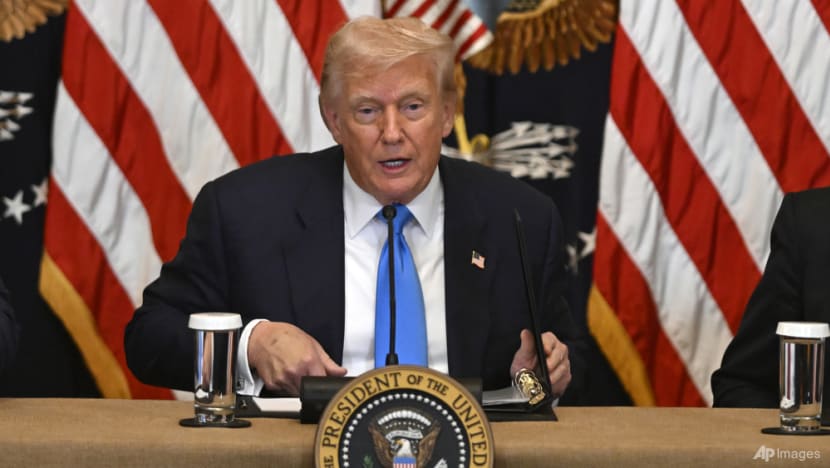Trump issues blitz of tariff announcements on copper, Brazil, small-value imports
Separately, Trump on Wednesday (Jul 30) also announced a 25 per cent tariff on goods from India, as well as a 15 per cent levy on imports from South Korea.

President Donald Trump speaks at an event in the East Room of the White House on Jul 30, 2025, in Washington. (Photo: AP/John McDonnell)
WASHINGTON: United States President Donald Trump on Wednesday (Jul 30) issued a blitz of tariff announcements ranging from changes to previously threatened levies on imports of copper and on goods from Brazil to ending an exemption from tariffs for small-value shipments from overseas.
The wave of announcements came as the clock ticked down toward an Aug 1 deadline for higher tariff rates to kick in on goods imported from most of the world as Trump presses on with his bid to reshape global trade. The president also touted what he said was a deal with South Korea that would include a 15 per cent US tariff on imports from the country.
Capping a day that began with Trump announcing a 25 per cent tariff rate on goods from India after months of negotiations between Washington and New Delhi failed to produce a trade deal, Trump said a 50 per cent tariff on copper pipes and wiring would kick in on Friday.
Details of the levy, though, fell short of the sweeping restrictions expected and left out copper input materials such as ores, concentrates and cathodes.
The surprise move dragged down US copper prices more than 17 per cent on the Comex exchange and unwound a premium over the London global benchmark that had grown in recent weeks, with shipments diverted there in anticipation of higher domestic prices.
"Markets are now busily repricing refined copper much lower after Trump's epic backflip on his own import tariff policy," said Tom Price, an analyst at the London brokerage Panmure Liberum.
"Someone must have finally got through to (Trump) that the US economy simply can't afford this new trade-hit."
Trump first teased the copper tariff in early July, implying that it would apply to all types of the red metal, ranging from cathodes produced by mines and smelters to wiring and other finished products.
Yet the proclamation released by the White House said the tariff will apply only to pipes, tubes and other semi-finished copper products, as well as products that copper is heavily used to manufacture, including cable and electrical components.
The move aids manufacturers, but does little to boost the constrained US copper mining industry, which for years has asked Washington for permitting reform or other steps that could fuel growth. The move is essentially a boost for Chile and Peru, two of the world's largest copper miners and major suppliers to the United States.
The measure came after a US investigation under Section 232 that Trump ordered in February, findings from which were delivered by Commerce Secretary Howard Lutnick on Jun 30.
BRAZIL
Trump on Wednesday slapped a 50 per cent tariff on most Brazilian goods to fight what he has called a "witch hunt" against former President Jair Bolsonaro, but softened the blow by excluding sectors such as aircraft, energy and orange juice from the heavier levies.
That came as a relief for many in Brasilia, who since Trump announced the tariffs, had been urging protections for major exporters caught in the crossfire. Shares of planemaker Embraer and pulpmaker Suzano rose.
"We're not facing the worst-case scenario," Brazilian Treasury Secretary Rogerio Ceron told reporters. "It's a more benign outcome than it could have been."
The new tariffs will go into effect on Aug 6, not Aug 1 as Trump announced originally.
"DE MINIMIS"
The White House also said the US is suspending a "de minimis" exemption that allowed low-value commercial shipments to be shipped to the United States without facing tariffs.
Under Trump's order, packages valued at or under US$800 sent to the US outside of the international postal network will now face "all applicable duties" starting on Aug 29, the White House said.
Trump earlier targeted packages from China and Hong Kong. The tax-and-spending bill recently signed by Trump repealed the legal basis for the de minimis exemption worldwide starting on Jul 1, 2027.
"Trump is acting more quickly to suspend the de minimis exemption than the OBBBA requires, to deal with national emergencies and save American lives and businesses now," the White House said, referring to the bill known as the One Big Beautiful Bill Act.
Goods shipped through the postal system will face one of two tariffs: either an "ad valorem duty" equal to the effective tariff rate of the package's country of origin or, for six months, a specific tariff of US$80 to US$200 depending on the country of origin's tariff rate.
SOUTH KOREA
Trump said late on Wednesday that he had settled on a 15 per cent US tariff on imports from South Korea as part of an agreement with the Asian trading partner that avoids even higher levies.
As part of the arrangement, South Korea would invest US$350 billion in the United States in projects selected by Trump and purchase US$100 billion of liquefied natural gas and other energy products, the US president said.
Of the US$350 billion investment fund, US$150 billion will be aimed at a shipbuilding partnership, South Korean President Lee Jae-myung said on Thursday, adding that the tariff deal with the US would put South Korea on an equal or better footing compared with other countries.
"It is also agreed that South Korea will be completely open to trade with the United States, and that they will accept American product including cars and trucks, agriculture, etc," Trump added.
It was not immediately clear how the investment deals would be structured or over what time frame. The US president said additional investments would be announced later.















